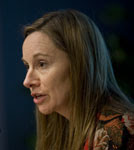-
VIDEO: Duff Gillespie on ‘Making the Case for U.S. International Family Planning Assistance’
›April 1, 2009 // By Wilson Center Staff“One dollar invested in family planning has a return on the investment of four dollars,” says Duff Gillespie in this expert analysis from the Environmental Change and Security Program.
“If you have a program that allows couples to avert having unwanted pregnancies, it also means there are less children to immunize – there are less schools that have to be built – there are less teachers that have to be trained.”
In this short video, Duff Gillespie, professor at the Johns Hopkins Bloomberg School of Public Health, discusses the recent report Making the Case for U.S. International Family Planning Assistance, and the need to increase funding for family planning around the world.
To learn more, please see a full summary and complete video of Duff Gillespie speaking recently at a March 17, 2009, Wilson Center launch of the report. -
VIDEO: Joseph Speidel on Population, Health, and Environment
›March 31, 2009 // By Wilson Center Staff“If we could do something about unintended pregnancy – which is about 80 million a year – we could dramatically reduce population growth,” and reduce pressure on the environment, says Joseph Speidel in this short expert analysis from the Environmental Change and Security Program.
Speidel, adjunct professor at the Bixby Center for Global Reproductive Health at the University of California, San Francisco, discusses population, health, and environment issues, and offers solutions for the way forward.
To learn more, please see a full summary and complete video of Joseph Speidel speaking recently at a March 17, 2009, Wilson Center event, “Making the Case for U.S International Family Planning Assistance (Report Launch).”
-
In Uganda, First Trip for Journalists Bolsters International Reporting
›March 24, 2009 // By Will Rogers U.S. journalists “are by and large dying for the opportunity to go overseas and learn about a whole range of issues, from refugees to human rights,” but often lack the support of their editors—the “gatekeepers”—to do so, said Louise Lief, deputy director of the International Reporting Project (IRP), at a February 26, 2009, event, “Reporting From Uganda: U.S. Media Cover Health, Environment, and Security.” Leif was joined by Paul Hendrie, department editor at Congressional Quarterly (CQ); David Rocks, senior editor at BusinessWeek; and Ben de La Cruz, a staff video journalist at The Washington Post, to discuss the recent IRP Gatekeeper trip to Uganda.
U.S. journalists “are by and large dying for the opportunity to go overseas and learn about a whole range of issues, from refugees to human rights,” but often lack the support of their editors—the “gatekeepers”—to do so, said Louise Lief, deputy director of the International Reporting Project (IRP), at a February 26, 2009, event, “Reporting From Uganda: U.S. Media Cover Health, Environment, and Security.” Leif was joined by Paul Hendrie, department editor at Congressional Quarterly (CQ); David Rocks, senior editor at BusinessWeek; and Ben de La Cruz, a staff video journalist at The Washington Post, to discuss the recent IRP Gatekeeper trip to Uganda.
President Museveni’s Surprising Views
“One of the advantages of these trips is when you go with a critical mass of 12 very senior editors…you can often get in to see the head of state,” said Leif, describing the group’s sit-down interview with President Yoweri Museveni of Uganda. One “big surprise for me was President Museveni’s views on population,” which he did not consider a challenge, said Lief, despite the country’s high total fertility rate of 6.7 children per woman.
She was heartened that the country’s poor infrastructure, including bad roads and unreliable electricity, did not deter Ugandan children from obtaining an education. “All along the road in brightly colored clothing there were thousands and thousands of children,” she said. “Some of them were walking for kilometers, but they were going to school.”
Organic Farmers Fight DDT in Uganda
“These things that we deal with in Washington every day have a real impact in the real world,” said CQ’s Paul Hendrie. He wrote a story on the Ugandan debate over using the pesticide DDT to combat the country’s significant malaria problem. “As one expert put it to me, ‘Farmers love DDT because it kills everything,’ and that’s why it was so popular”—and why it was banned in the United States.
“Uganda has developed an industry, a fledgling industry, of certified organic farmers. They’re the leading organic exporter in Africa and thirteenth in the world,” explained Hendrie. Farmers are concerned “that if traces of DDT are found in these products, they’ll be shut out of markets, especially in Europe, their biggest market.”
“It’s kind of ironic then that in Uganda now, today, the fight against the use of DDT is not being so much led by environmentalists as by farmers, and specifically organic farmers,” Hendrie noted.
Investigating Uganda’s Economy “In a developing country, what is it that moves people, that makes the economy grow?” BusinessWeek’s David Rocks wondered before visiting Uganda.
“In a developing country, what is it that moves people, that makes the economy grow?” BusinessWeek’s David Rocks wondered before visiting Uganda.
“One of the companies that struck me was Kiwi Shoe Polish,” he said. Many people keep their shoes “for 10 or 15 years, so you have to keep them shined and polished and in good shape in order to use them.” But Chinese companies have begun counterfeiting the polish, causing Kiwi’s sales to plummet 50 percent in the last year. “It’s the poorest of the poor who are getting ripped off,” he said.
“I think that there is a lot of room for interesting economic and business stories to be done from Africa,” said Rocks, who is a senior editor at the magazine. “I hope to get my people to do more and more of that.”
Seeds of Peace in the IDP Camps
“The focus of my reporting was basically on security issues in the north, in the Gulu region, where there’s been a 20-year civil war,” said Ben de la Cruz, who filmed several videos for The Washington Post documenting the dangers of life in Uganda’s internally displaced persons (IDP) camps. In the online multimedia presentation “Seeds of Peace,” IDPs tell their wrenching stories, and peace mediator (and former Wilson Center Scholar) Betty Bigombe provides historical and political context on Uganda’s civil war.
“Despite the two years of relative peace, lots of people are still living in the camps and are afraid to leave,” de la Cruz explained. “There’s a huge fear factor because of Joseph Kony’s rebels—even though they had a ceasefire, they’re always afraid he’s going to come back.”Photos: From top to bottom: Louis Lief, Paul Hendrie, David Rocks, and Ben de la Cruz. Courtesy of Dave Hawxhurst and the Woodrow Wilson Center.
-
Water a National Security Issue, Says Senator Richard Durbin
›March 20, 2009 // By Will Rogers “Water access is no longer simply a global health and development issue; it is a mortal and long-term threat that is increasingly becoming a national security issue,” said Senator Richard Durbin at a March 17, 2009, event on Capitol Hill. Introducing the Paul Simon Water for the World Act of 2009, Senator Durbin called for renewed American leadership on the global water crisis plaguing billions around the world.
“Water access is no longer simply a global health and development issue; it is a mortal and long-term threat that is increasingly becoming a national security issue,” said Senator Richard Durbin at a March 17, 2009, event on Capitol Hill. Introducing the Paul Simon Water for the World Act of 2009, Senator Durbin called for renewed American leadership on the global water crisis plaguing billions around the world.
“The United States needs to do much more to ensure that global water access is protected and expanded,” he said. Senator Durbin’s remarks come on the heels of the Fifth Global Water Forum held in Istanbul, Turkey this week, and precede UN World Water Day on March 22, 2009.
“The global water crisis is a quiet killer,” Durbin said. “In the developing world, 5,000 children die every day from easily preventable water-related illnesses such as cholera, typhoid, and malaria, diseases that have been all but eradicated in wealthier nations.”
The Water for the World Act of 2009 expands a commitment from the earlier Paul Simon Water for the Poor Act of 2005, which has had notable success in focusing U.S. aid on water-related assistance. From 2007-2008, for instance, the U.S. helped provide 2 million people with access to an improved source of drinking water and more than 1.5 million people to improved sanitation.
But these efforts need to be scaled up to reach the billions of people without clean water. According to Representative Earl Blumenauer, speaking at the same event, there are more people in the world today without access to adequate sanitation than the populations of China and India combined. The Water for the World Act of 2009 will seek to provide “100 million people around the world with sustainable access to clean water and sanitation by 2015,” said Durbin.
In addition, if passed, the act will make water a development priority for U.S. foreign assistance and “designates within the State Department a high-level representative to ensure that water receives priority attention in our foreign policy, and establishes a new Office of Water at USAID to implement development assistance efforts related to water,” Durbin said.
Access to clean water and adequate sanitation is a cornerstone for sustainable development around the world. Developing countries will not be able to build their economies or bring their resources to fruition if people in these countries have to travel for hours to find water, or are “too sick from drinking unsafe water, to work or to go to school,” Durbin warned.
Improving access to safe water will not only reduce mortality from waterborne illness, but will help provide long-term stability in countries that suffer from population pressures due large population growth from high total fertility rates. In developing countries, 3,900 children under 5 years old die every day from waterborne illness. “Mothers who fear the deaths of their children bear more, in a desperate race against the odds,” said Senator Durbin. While access to education and family planning programs is also essential to reducing high fertility rates in developing countries, so too is basic access to safe drinking water and sanitation.
But funding for water infrastructure and sanitation programs is just the first step. In developing countries, poor governance is a major roadblock to implementing successful development projects. Unregulated privatization of water can prevent the “voiceless and powerless” poor from gaining access to the water services they need, Durbin cautioned.
To address the challenges of governance, the bill will help “build the capacity of poor nations to meet their own water and sanitation challenges,” Durbin said, by providing “technical assistance, best practices, credit authorities, and training to help countries expand access to clean water and sanitation.”
Working to ensure access to safe water and adequate sanitation can help implement the “smart power” strategy the U.S. desperately needs during a period when the world is redefining America – a strategy to help provide “things people and governments in all quarters of the world want but cannot attain in the absence of American leadership,” writes the Center for Strategic and International Studies (CSIS) Commission on Smart Power.
CSIS President John Hamre said the U.S. should re-establish its moral leadership in the world by making a serious commitment to increasing access to clean water and adequate sanitation. CSIS recently issued a Declaration on U.S. Policy and the Global Challenge of Water, endorsed by more than 35 leaders in business, government, and academia, and called on President Obama “to launch a bold new U.S. campaign to address the global challenge of water.”
“Throughout history, civilized nations have put aside political differences to address compelling issues of life and survival,” said Senator Durbin. “Our generation owes the world nothing less.”
Photo: Senator Richard Durbin. Courtesy of the Office of Senator Richard Durbin. -
VIDEO: Avner Vengosh on Radioactivity in Jordan’s Fossil Groundwater
›March 18, 2009 // By Wilson Center StaffIn Jordan, “we investigated about forty wells, and in a large number of them we found high levels of naturally occurring radium,” says Avner Vengosh in this short expert interview from the Environmental Change and Security Program (ECSP). “Several studies have shown that long-term exposure to this element in drinking water would increase the probability of bone cancer and leukemia,” and “millions of people are potentially going to be exposed to this level of radium,” he warns. In this short video, ECSP visits Vengosh, associate professor of earth and ocean sciences at Duke University, on location in Durham, North Carolina. Vengosh discusses his recent discovery of naturally occurring radioactivity in Jordan’s fossil groundwater at levels up to 2000 percent higher than the international drinking-water standard.
To learn more about the naturally occurring radioactivity in Jordan’s fossil groundwater, read Vengosh’s original article, “High Naturally Occurring Radioactivity in Fossil Groundwater from the Middle East,” in the peer-reviewed Environmental Science and Technology. -
Weekly Reading
›“A New Military Mission: Clean Energy,” part of the Center for American Progress’ “It’s Easy Being Green” series, highlights the military’s attempts to become more energy-efficient. Read more about the U.S. military’s environmental initiatives.
Simon Dalby, a professor at Carleton College, discusses the evolution of environmental security with John Tessitore, executive editor of the Carnegie Council, in a video interview (transcript available).
Climate Change, Food Security, and the Right to Adequate Food examines climate change’s expected impact on food production, with a special focus on Africa and Asia.
The BDA Foundation, a Canadian charity, and PharmAfrica, a pharmaceutical company, are working to create a medicinal plants industry that will lift local people out of poverty in the Democratic Republic of the Congo. -
Testosterone: The Ultimate Weapon of Mass Destruction?
›March 1, 2009 // By Will Rogers “The ultimate weapon of mass destruction—and perhaps of economic destruction—is the testosterone molecule,” quipped Malcolm Potts at the February 11, 2009, discussion of his new book, “Sex and War: How Biology Explains War and Offers a Path to Peace,” which explores the pivotal question, “Why do human beings systematically and deliberately kill our own species?” Potts, the Bixby Professor of Population and Family Planning at the University of California, Berkeley, was joined Science magazine’s Ann Gibbons, a leading correspondent on human evolution, who examined whether aggressive human behaviors are evolving in response to changing social structures.
“The ultimate weapon of mass destruction—and perhaps of economic destruction—is the testosterone molecule,” quipped Malcolm Potts at the February 11, 2009, discussion of his new book, “Sex and War: How Biology Explains War and Offers a Path to Peace,” which explores the pivotal question, “Why do human beings systematically and deliberately kill our own species?” Potts, the Bixby Professor of Population and Family Planning at the University of California, Berkeley, was joined Science magazine’s Ann Gibbons, a leading correspondent on human evolution, who examined whether aggressive human behaviors are evolving in response to changing social structures.
Testosterone: Risky Business
“In 1987, some anthropologists and sociologists made a statement at UNESCO that it is scientifically incorrect to say we’ve inherited a tendency to make war from our animal ancestors,” said Potts. “I think that that is wrong.” Evolutionary psychology suggests that humans have inherited certain predispositions that “help us adapt to find food, select mates, avoid danger, and compete for resources in a hostile world,” said Potts. Men compete for women, so it is logical, from a reproductive standpoint, that men would take more risks than women, he argued.
In addition, “there’s strong evidence that there is a genetic tendency for men in the prime of life to attack and kill their neighbors,” Potts noted, while emphasizing that this does not mean that men are preordained to fight one another. “Such predispositions are extraordinarily flexible,” and respond well to peaceful cultural norms.
The Pill Is Mightier Than the Sword
“Once we recognize our violent origins, then we need to ask not ‘why do wars break out?’ but ‘why does peace break out?’” posed Potts. “Judged on the basis of same-species killing,” the violent 20th century may have been the most peaceful in human history, he claimed.
“In the whole of recorded history, I cannot find a single example of women banding together spontaneously and then going out to attack a neighboring group,” maintained Potts. He argued that increasing women’s individual freedom and collective power in civil society and government is the best way to achieve a more peaceful world. More specifically, slowing population growth and promoting more balanced age structures by giving women access to family planning will contribute not just to their own autonomy, but also to long-term peace, he argued.
Evolving To Become Less Aggressive?
“Humans are capable of incredible acts of kindness but also despicable acts of terror,” said Gibbons. “We murder, slaughter, barbeque, and even eat our own species, and we’ve been doing it for a long time.” But it is difficult to determine whether this propensity for aggression is an ancient trait or has more recently evolved. “There are no other human species alive to show us different models for male aggression…so we have look at fossils, DNA, and our closest relatives—the chimpanzees and gorillas,” Gibbons said.
Human aggression may be continuing to evolve. As Gibbons explained, “researchers, as they look at the human genome project—the HapMap Project—have discovered there are many, many genes that have come under natural selection that have evolved in the last 100,000 years, since modern humans spread out of Africa.” Therefore, as warfare becomes less necessary to our daily survival, our species might evolve to become less aggressive. “Are we seeing, in our sexual selection, mates being chosen that are a little less aggressive?” Gibbons asked. “We are still evolving,” she emphasized. “The story isn’t over yet.”Photos: From top to bottom, Malcolm Potts and Ann Gibbons. Courtesy of Dave Hawxhurst and the Woodrow Wilson Center.
-
East Africa PHE Network: Translating Strong Results Into Informed Policies
›February 24, 2009 // By Rachel Weisshaar“The road to inaction is paved with research reports,” said Marya Khan, our Population Reference Bureau facilitator, opening today’s East Africa Population-Health-Environment (PHE) Network workshop on bridging the research-to-policy gap.
At the Environmental Change and Security Program, we know all too well that even the best program or most dramatic research findings don’t stand a chance of being implemented unless they are communicated to policymakers in succinct, persuasive formats. Yet researchers often neglect to convey their results to decision makers and donors, assuming they won’t be interested or won’t appreciate their methodologies, explained Khan. Furthermore, researchers are often hesitant to draw out the policy implications of their findings, believing this is policymakers’ responsibility, while policymakers tend to think this is researchers’ duty—so these critical implications are often never explored.
Today’s sessions aimed to empower the PHE working groups from Rwanda, Uganda, Ethiopia, and Kenya to develop their own strategies to bridge the research-to-policy gap. The groups brainstormed policy communications objectives they wished to achieve—such as officially launching their country PHE network—as well as concrete outcomes that would contribute to accomplishing those objectives—such as convincing representatives from various national government ministries to join their network.
Rachel Weisshaar is attending the meeting of the East Africa PHE Network in Kigali, Rwanda. She will be posting daily updates on the New Security Beat throughout the week (see yesterday’s post).
Photo: Members of the Kenya PHE Working Group discuss communications strategies. Courtesy of Rachel Weisshaar.
Showing posts from category global health.


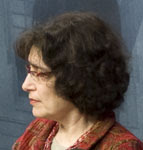 U.S. journalists “are by and large dying for the opportunity to go overseas and learn about a whole range of issues, from refugees to human rights,” but often lack the support of their editors—the “gatekeepers”—to do so, said Louise Lief, deputy director of the International Reporting Project (IRP), at a February 26, 2009, event, “
U.S. journalists “are by and large dying for the opportunity to go overseas and learn about a whole range of issues, from refugees to human rights,” but often lack the support of their editors—the “gatekeepers”—to do so, said Louise Lief, deputy director of the International Reporting Project (IRP), at a February 26, 2009, event, “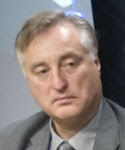
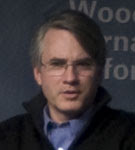 “In a developing country, what is it that moves people, that makes the economy grow?” BusinessWeek’s David Rocks wondered before visiting Uganda.
“In a developing country, what is it that moves people, that makes the economy grow?” BusinessWeek’s David Rocks wondered before visiting Uganda.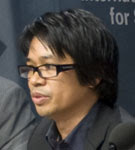
 “Water access is no longer simply a global health and development issue; it is a mortal and long-term threat that is increasingly becoming a
“Water access is no longer simply a global health and development issue; it is a mortal and long-term threat that is increasingly becoming a 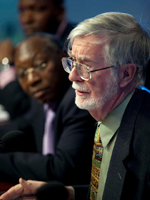 “The ultimate weapon of mass destruction—and perhaps of economic destruction—is the testosterone molecule,” quipped Malcolm Potts at the February 11, 2009, discussion of his new book, “
“The ultimate weapon of mass destruction—and perhaps of economic destruction—is the testosterone molecule,” quipped Malcolm Potts at the February 11, 2009, discussion of his new book, “